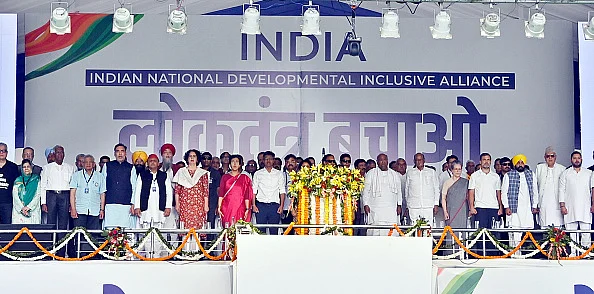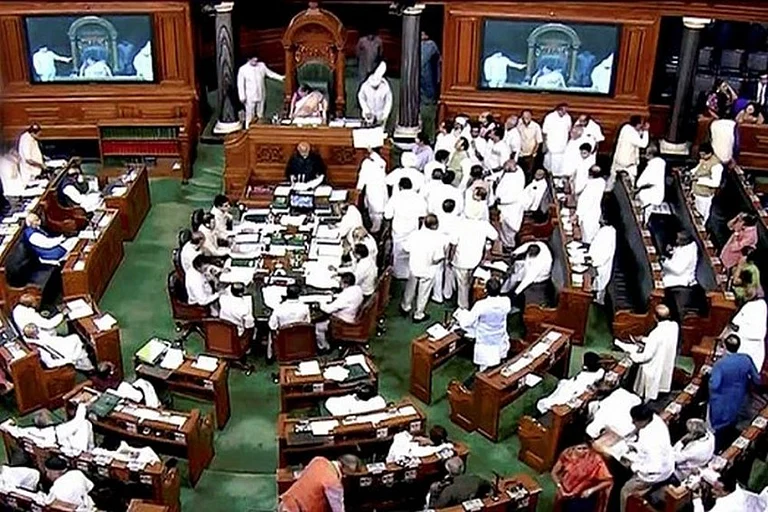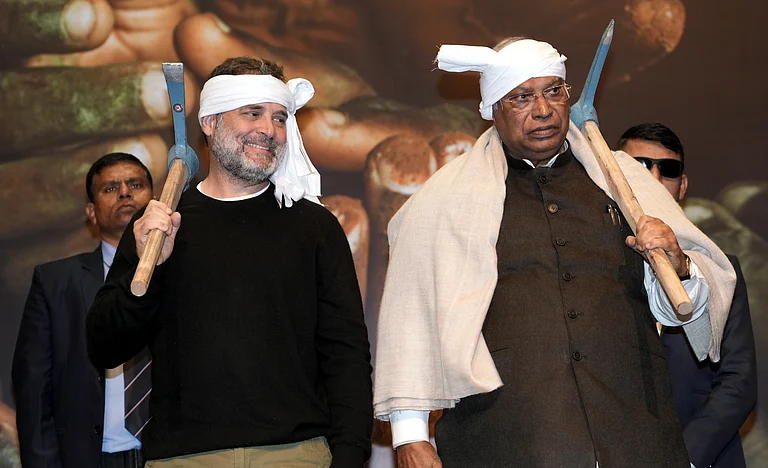The year 1975 marked a pivotal and controversial period in India's history with the declaration of a state of emergency by then Prime Minister Indira Gandhi. As India marked 50 years of the imposition of Emergency by Prime Minister Indira Gandhi on June 25, 1975, leaders of the Bharatiya Janta Party sought an apology from Congress as it had “betrayed” the nation. BJP-led NDA MPs including union ministers demonstrated outside Parliament, targeting the Congress for violating the constitution. The protests come in the backdrop of the Congress and Opposition parties’ 'Save the Constitution' rhetoric during and after the Lok Sabha 2024 elections.
The Congress and its allies in the INDIA bloc have been persistently targeting the Narendra Modi government for its alleged attack on constitutional values. The ruling alliance has sought to turn the tables by launching a frontal counterattack over the Emergency. Lasting till March 21, 1977, the Emergency period was characterised by a suspension of civil liberties, censorship of the press, arbitrary arrests, and widespread political repression. The period is often dubbed as one of the darkest phases of democracy in India. On June 25, Lok Sabha Speaker Om Birla adjourned the House after reading out a resolution condemning the imposition of Emergency and flaying then Prime Minister Indira Gandhi for her attack on the Constitution, a large number of BJP-led NDA MPs assembled outside, carrying placards and raising slogans. Prime Minister Narendra Modi also tore into Congress over the issue, stating that those who had imposed the emergency had no right to profess their love for the constitution.
Birla’s references led to a war of words between the ruling and Opposition alliance leaders with the latter claiming the references could have been avoided. On Thursday, Congress formally lodged a protest Birla's reference to Emergency just a day after taking charge as Speaker. Leader of Opposition Rahul Gandhi and other INDIA bloc MPs including Supriya Sule (NCP-SP), Misa Bharati (RJD) and Kanimozhi (DMK) have criticised the move, calling it a “political tactic” and "a very grave matter impacting Parliament's credibility". Congress president Mallikarjun Kharge also accused the BJP of “10 years of undeclared emergency” and said that the Prime Minister kept raking up the past to hide his failures.
“Breaking parties, toppling elected governments through the backdoor, misuse of agencies like ED, CBI, IT against 95 per cent of Opposition leaders, putting Chief Ministers in jail, and using the official machinery before elections and disturbing the level playing field, is this not undeclared Emergency,” he asked in a social media post.
Indeed, critics of the Modi-led BJP and NDA government have on variations occasions used variations of this phrase to express their concerns about what they perceive as authoritarian tendencies or actions that they believe undermine democratic principles. In his book “India’s Undeclared Emergency: Constitutionalism and the Politics of Resistance”, author Arvind Narrain draws political and legal parallels between the crisis India faced in the 1975-77 and the different but potentially more damaging crisis that India is facing now. He highlights that the Modi government, “unlike the Congress government of 1975, draws on popular support and this raises the dangerous possibility that today's authoritarian regime could become tomorrow's totalitarian state”.
“The totalitarian ambitions of the Modi regime are understood by the main political opposition. The Left has regularly characterised it as fascist, and even Rahul Gandhi, a leader of a centrist party which was responsible for the Emergency, has alluded to the distinction. When asked about the Emergency, Rahul Gandhi said, ‘I think that was a mistake’,” Narrain wrote.
The author also highlighted, “at least six factors which mark Modi’s rule as inaugurating a new kind of State, going beyond the ‘authoritarian’ or ‘sultanist’ features that it shares with the Emergency period”. These include the fact that the BJP’s ideological moorings in Hindutva and Hindu nationalism run much deeper than the thoughts and motivations leading up to the Emergency. The party has the support of civil society groups like the RSS which connects a vast network of people, and also a large section of media and corporate sector which critics feel allows the party to control the narrative and its image, thus ensuring popular support. Narrain also described the “power of the mob” to benefit the ruling alliance.
BJP’s ideological push has not even left laws unturned. In fact, Narrain notes that the “enactment of the CAA marked a moment when legislative change emerged as a viable route to take forward the ideological vision of the regime”. Other legal changes like the tightening of the anti-cow slaughter laws in Maharashtra and Karnataka as well as the anti-conversion and anti-‘love jihad’ laws enacted in Uttarakhand, Uttar Pradesh and Madhya Pradesh and on the cards in Haryana and Karnataka indicate an emerging legal framework which puts in place second-class citizenship for both religious and caste minorities.” The party has also been criticised for replacing the existing IPC, CrPC and Evidence Act with three new laws, namely the Bharatiya Nyaya Sanhita (BNS), Bharatiya Nagarik Suraksha Sanhita, and Bharatiya Sakshya Sanhita will come into force on July 1. Calling the new laws "anti-people and draconian," the Bar Council of West Bengal recently said that it will observe a "black day" on July 1.
The 1975 Emergency was also a time known for censorship and throttling of dissent by arresting Opposition leaders, activists, academics and dissenters and putting them in jail under preventive detention laws. Some of the leaders who went to jail in 1975-77 include Jayaprakash Narayan (JP), Morarji Desai, Atal Bihari Vajpayee, L K Advani George Fernandes, Madhu Limaye, Chandra Shekhar, Arun Jaitley (as a student activist).
For its part, the BJP has been repeatedly accused of using laws like Money Laundering Act, 2002 (PMLA) and institutions like the Enforcement Directorate to jail Opposition leaders. West Bengal CM and Trinamool Congress chief Mamata Banerjee had said in 2022 that both have been used to jail opposition leaders for prolonged periods without trial. Ahead of Lok Sabha polls, the ruling party was slammed for the arrest of two Opposition leaders and sitting Chief Ministers, Aam Aadmi Party chief Arvind Kejriwal and Jharkhand Mukti Morcha (JMM) by the ED. A recent investigation by The Indian Express found that since 2014, 25 Opposition leaders facing corruption probe have crossed over to BJP and 23 of them got reprieve. In 2022, IE had reported that since 2014, 95 per cent of prominent politicians that ED and Central Bureau of Investigation (CBI) took action against were from the Opposition. As per the 2023 prison census report by the Committee to Protect Journalists, seven Indian journalists were behind bars with four facing UAPA. Free press has also been declining in recent years, data shows. According to the press freedom index published by Reporters Without Borders, India is currently ranked 159 out of the 180 nations analysed when it comes to press freedom.
In the backdrop of arrests, comparisons between present times and the emergency period were made several times in the pre-poll season this year. Former Delhi Commission of Women chief Swati Maliwal had said ahead of polls in Delhi, “Arvind Kejriwal arrested, Hemant Soren arrested, Congress Bank Accounts frozen, Election Commissioners resigning, Electoral Bonds scam not being investigated…If this is not a state of emergency, what is?”
“There is, however, a world of qualitative differences between now and then. Politicians may want to use the term ‘Emergency’ or as a slogan but they have to realise that it doesn’t work,” political analyst Rasheed Kidwai told Outlook previously.
“The acts by Indira Gandhi which were deemed “unconstitutional” or illegal were proven or declared to be so by the country’s laws, intelligentsia and agencies. Gandhi’s own election was set aside by the Allahabad High Court in 1974 which her critics believe may have led to her decision to implement emergency, thereby freezing all democratic channels.
As opposed to that, most of the arrests made under Modi government are backed by law. “The arrests of leaders, even those known to have high integrity like Manish Sisodia, Soren or Kejriwal, are being carried out within the legal framework and the law seems to be against them. Therefore, they are not even able to get bail”.
There is also a shift in the attitudes of media and civil society. Much of mainstream media, which acted at a watchdog capacity in the 70s and publicly resisted censorship, has today become largely polarised and aligned with the party in power. “Moreover, they have shown not just indifference but have been rather adversarial to the Opposition” Kidwai added.
Amid the fresh row over Emergency, Congress leader Jairam Ramesh said that the Congress has already been punished for Emergency. He tweeted, “Emergency was imposed by Congress by a Constitutional provision in June 1975. Elections were held in March 1977. Congress was brutally punished. The same electorate in Jan 1980 returned Congress with huge majority that has eluded Modi who has imposed undeclared Emergency".
(with inputs from PTI)




























